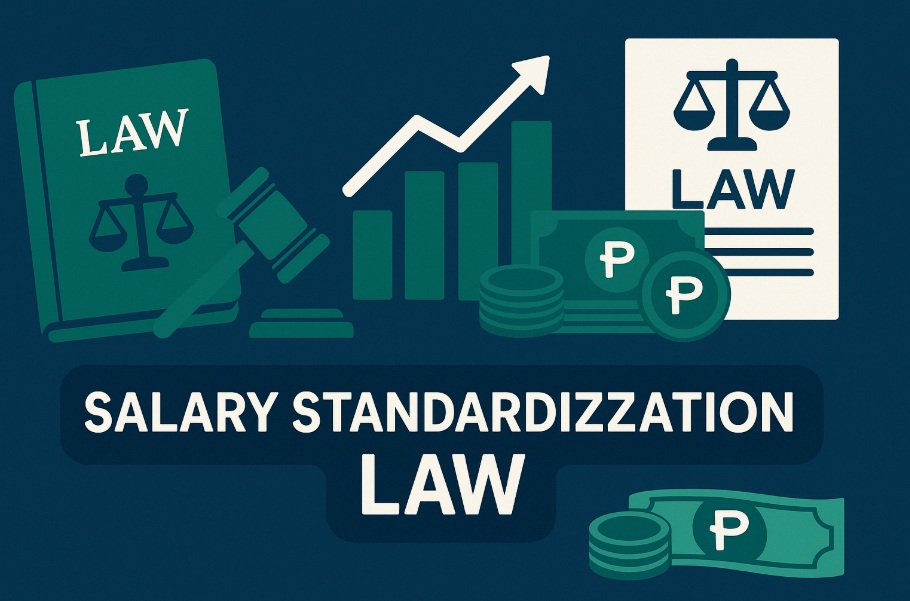Salary Standardization Law 2025
The Salary Standardization Law 2025 is one of the most awaited updates for government employees across the Philippines. Every few years, Congress passes a new SSL to increase the salaries of public workers, from entry-level clerks to teachers, nurses, and high-ranking officials.
While the Salary Grade 2025 table shows the numerical breakdown of monthly pay by grade and step (which you can find here Salary Grade 2025), the SSL 2025 itself focuses on the policy, law, and implementation rules behind those salary increases.

What is the Salary Standardization Law (SSL)?
The Salary Standardization Law (SSL) is a government initiative passed by Congress and signed by the President to adjust and upgrade the salaries of public workers.
-
It defines pay scales, increments, and tranches of increases.
-
SSL ensures fair compensation across different government agencies.
-
It affects both national government employees and many LGU (Local Government Unit) personnel.
In simple terms:
-
SSL = law or policy.
-
Salary Grade (SG) = actual salary table.
When planning your finances, understanding both loans and salary regulations is important. Knowing the SSS salary loan requirements helps you determine how much you can borrow and under what conditions, while the SSL ensures you are aware of your entitlements and how salaries are structured across positions. Combining this knowledge helps you make informed financial decisions.
Legal Basis and History of SSL in the Philippines
The Philippines has seen several versions of SSL since the 1980s. Each one gradually increased wages for civil servants:
-
SSL I – Started in 1989, laid the foundation for unified pay scales.
-
SSL II – Approved in 1994, added more increments.
-
SSL III – Rolled out in 2009, introducing higher adjustments.
-
SSL IV – Covered 2020–2023 with four tranches of increases.
-
SSL 2025 – The latest update, expected to continue upgrading salaries until 2027.
The law is typically pushed by Congress with guidance from the Department of Budget and Management (DBM).
Key Features of SSL 2025
The SSL 2025 comes with several highlights:
-
Coverage: Applies to teachers, nurses, clerks, soldiers, police officers, and other regular government staff.
-
Implementation period: Tranches from 2025 until 2027.
-
Focus: Raises the minimum salary for SG 1 employees and provides proportional increases for higher SG levels.
-
Inclusion: National government agencies and, when budgets allow, LGU personnel.
-
Step increments: Still applied within each grade, rewarding tenure and experience.
How SSL 2025 Impacts Government Workers
The biggest beneficiaries of SSL 2025 are rank-and-file employees.
-
SG 1 workers (messengers, utility staff, clerks) see their pay upgraded to meet higher cost-of-living standards.
-
Teachers and nurses receive mid-level increases, helping address retention issues.
-
Military and uniformed personnel also get adjusted salaries as part of government commitments.
-
Senior officials see smaller percentage increases to maintain fair distribution.
For example:
| Position | SG | Salary (2024) | Salary (2025 est.) | % Increase |
|---|---|---|---|---|
| Administrative Aide I | 1 | ₱13,000 | ₱15,000 | +15% |
| Teacher I | 11 | ₱27,000 | ₱29,500 | +9% |
| Nurse II | 15 | ₱36,600 | ₱39,000 | +7% |
| Police Officer I | 10 | ₱25,500 | ₱27,600 | +8% |
(Note: Figures are estimated based on DBM proposals and subject to official DBM release.)
SSL 2025 vs Salary Grade Table 2025
It’s important to distinguish between the two:
-
SSL 2025 = The law that authorizes increases and sets the policy.
-
Salary Grade Table 2025 = The actual numerical table of pay per grade, step, and tranche
Challenges and Criticisms of SSL 2025
While SSL 2025 is a welcome update, it comes with challenges:
-
Budget limitations – Not all LGUs can immediately match the increases.
-
Delayed implementation – Tranches may be postponed if funding is short.
-
Inflation impact – Salary hikes sometimes fall behind rising living costs.
-
Equity debates – Questions remain if mid-level professionals get fair shares compared to top officials.
Frequently Asked Questions
When will SSL 2025 take effect?
It is expected to start in January 2025, with tranches spread until 2027.
Who are covered under SSL 2025?
All regular government employees—teachers, nurses, military, police, clerks, and LGU personnel (if funds allow).
How much increase can an SG 1 expect?
Around ₱2,000–₱3,000 increase compared to 2024.
Does SSL 2025 apply to contractual workers?
No, it mainly applies to plantilla positions, though some contractual staff may receive allowances.
Is SSL 2025 the last salary law?
No. Congress may pass further salary standardization measures after 2027.
The Salary Standardization Law 2025 is more than just numbers, it’s a legal framework designed to improve the lives of government employees. By raising pay scales across various salary grades, the law strengthens employee retention, boosts morale, and helps align compensation with the country’s economic realities.






